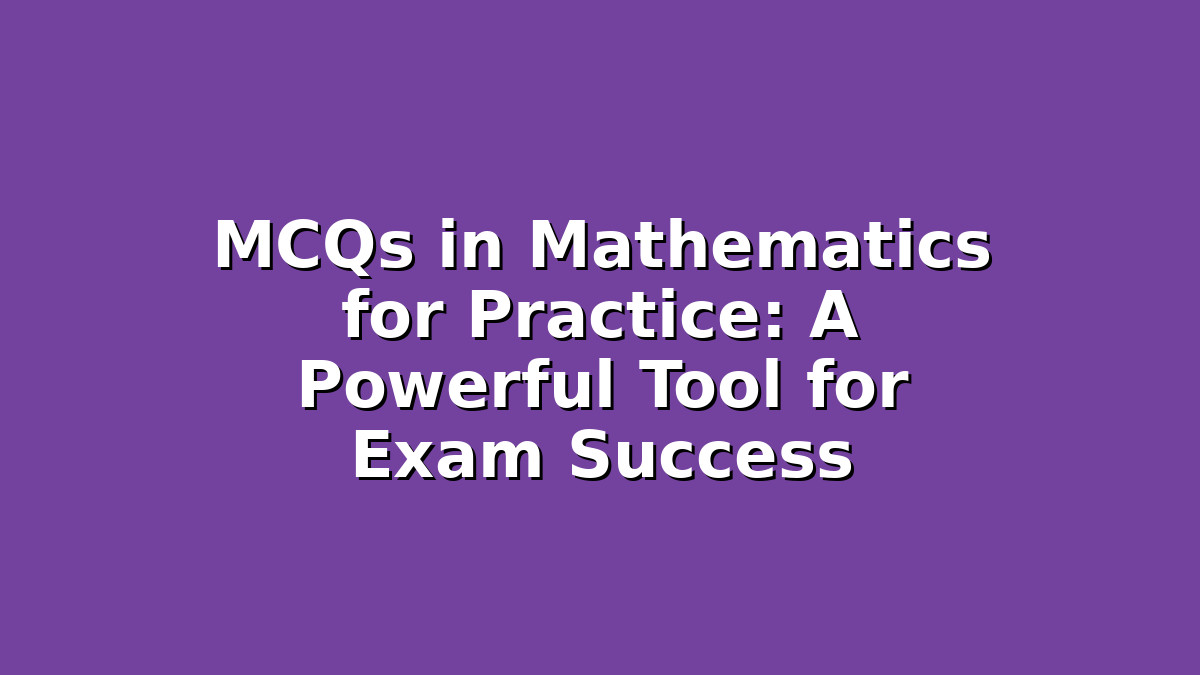Mathematics is a subject that often challenges students, especially when preparing for exams. One of the most effective ways to strengthen your math skills and boost confidence is by practicing Multiple Choice Questions (MCQs). Whether you are preparing for school tests, competitive exams, or entrance assessments, focusing on MCQs can sharpen your problem-solving abilities and help you manage time efficiently during exams. In this article, we will explore why MCQs in mathematics are so valuable, how to use them effectively, and practical tips to maximize your study sessions.
Why Practicing MCQs in Mathematics is Essential
Multiple Choice Questions are a popular format in many examinations because they test a wide range of knowledge in a relatively short time. For students, practicing MCQs offers several benefits:
1. Comprehensive Coverage: MCQs often cover different topics and difficulty levels, allowing you to review various concepts at once.
2. Immediate Feedback: Most MCQ practice materials provide answer keys, so you can instantly identify mistakes and understand where you need improvement.
3. Time Management: Working through MCQs helps you develop the skill to solve problems quickly and accurately, an important factor during timed exams.
4. Analytical Thinking: MCQs encourage you to think critically and eliminate wrong options, honing your analytical skills.
For students preparing for exams, regular MCQ practice is a strategic way to build familiarity with the exam format and reduce anxiety.
Section 1: How to Incorporate MCQs into Your Study Routine
To get the most out of MCQs, it is important to integrate them effectively into your overall study plan. Here’s how you can do it:
– Start with Basics: Begin your preparation by practicing MCQs on fundamental concepts. This approach ensures that you have a solid foundation before moving on to complex problems.
– Set Daily or Weekly Goals: Decide on a specific number of MCQs to solve each day or week. For example, 20–30 questions daily can keep you consistently engaged without feeling overwhelmed.
– Mix Topics: Don’t focus on just one area. Mix questions from algebra, geometry, trigonometry, and calculus to keep your mind sharp and diversified.
– Simulate Exam Conditions: Occasionally, time yourself while solving MCQs to simulate real exam conditions. This practice builds stamina and helps you pace yourself during the test.
By making MCQs a regular part of your study sessions, you turn passive learning into an active, engaging process.
Section 2: Strategies for Tackling MCQs Effectively
Simply practicing MCQs is not enough. Knowing how to approach them strategically can help you maximize your score:
– Read Questions Carefully: Sometimes MCQs include tricky wording. Take the time to understand exactly what is being asked before jumping to solve.
– Eliminate Wrong Answers: Use the process of elimination to discard obviously incorrect options. This increases your chances if you need to guess.
– Check Units and Values: Especially in math, paying attention to units and numerical values in the options can prevent careless mistakes.
– Skip and Return: If a question seems too hard, skip it and return later. This prevents wasting too much time and helps maintain focus.
– Review Your Answers: If time permits, always check your answers to catch any silly mistakes or miscalculations.
Practicing these strategies during your MCQ sessions will sharpen your critical thinking and improve accuracy.
Section 3: Resources and Tools for MCQ Practice in Mathematics
Access to quality practice materials can make a significant difference in your preparation. Here are some resources and tips to find the best MCQ practice materials:
– Textbooks and Workbooks: Many math textbooks include MCQs at the end of chapters. Use these as your initial resource.
– Online Platforms: Websites such as Khan Academy, Brilliant, and various educational forums offer free and paid MCQ quizzes tailored to different difficulty levels.
– Mobile Apps: There are numerous apps designed for math MCQ practice which you can use on-the-go. Apps often come with timers and instant feedback features.
– Past Exam Papers: Reviewing past papers of your school or competitive exams helps you get familiar with the question style and difficulty.
– Study Groups: Collaborate with peers to quiz each other with MCQs. This interaction can help clarify doubts and expose you to new problem-solving methods.
Remember, consistent practice using diverse resources keeps your preparation dynamic and comprehensive.
Conclusion
MCQs in mathematics are an indispensable part of exam preparation that can boost your confidence and improve your problem-solving speed. By incorporating MCQs into your daily study routine, applying smart strategies to answer them, and utilizing quality study resources, you set yourself up for success. Remember that practice makes perfect, and every question you solve brings you one step closer to mastering mathematics. Stay motivated, keep practicing, and approach your exams with confidence!

Responses